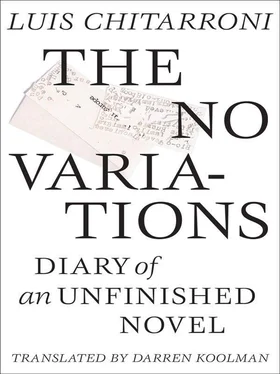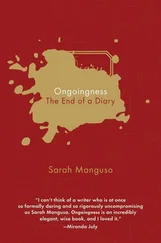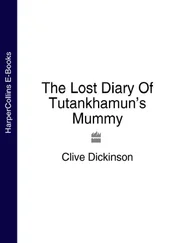12.22. I recapitulate. The reforms were initiated in 1969, année erotique , when it was rumored the place was bought by one of Hugh Hefner’s henchmen, who renamed it the Venus Club. “The business didn’t change, but the decorations did: the naturalist engravings were all replaced by paintings with an abstract motif, and all the bidets had to have printed on them the signature ‘F. Mutt.’ The interior decorator was an American conceptual artist,” said Hernán (none other than Bob Guteron, he eventually said after making us guess). “It’s still possible to see the originals today,” he added, but then immediately regretted the disclosure. Aída shrugged it off though. She wanted to finish her account: “The business is now owned by a group of Germans,” she said. “And like an old family heirloom taken out of the attic and restored to pride of place, they decided to reinstate the old alphabetical custom of naming the prostitutes. Except now, the names are all gringo: Ada Adcock, Fiona Farlow, Zaida Zorn … a consequence of globalization, no doubt.” “But it was just the same before,” yelled Luini …
In 1980, a certain fugitive called Lady Lumumba had jeopardized the integrity of the entire city-state. She transformed Villa Venus into a kind of mini-Cuba — not the free Cuba, but the communist one — with herself as Fidel Castrobarbarella. Luckily, someone intervened and restored things to normality. Hernán knew her. He didn’t provide any details.
12.29. “Are those names real or did you just invent them?” asked Luini, almost beside himself. And Aída answered him with calm disdain, adjusting her sunglasses with casual precision, “No, I didn’t just invent them. In fact, let me think … O yes, one of them happens to be my best friend.” “O really, which one?”
Samuel Johnson called those people most susceptible to enjoying the privileges and tolerating the hardships of a vulnerable institution “ clubbables .”
12.38. After reading the Excelsior, we learned that Federico Prosan (who, at last, had learned how to ride) was heading from Chiapas to Mexico City. That our compatriot had managed to overcome this difficulty was, to Zi Benno and me, a cause of immense joy and patriotic pride. (And we remembered Belgrano, who, before embarking on the Northern Campaign, could only visit the city by dogcart.) That Prosan — after his marriage to the Mexican — became a righteous leader seemed incredible to the people of Buenos Aires, where, while he was still living there (some time before we’d arrived), everyone believed (as one of his best friends told me) “he had the social conscience of an electrical appliance.” But Mexico is different. Mexico changes everyone.
12.42. An author of works I’ve rarely encountered, Federico Prosan had great success in Mexico and the rest of Latin America with a series of novels whose titles were inspired by the argot of a local sport: They’re Copacetic, From Chaco to Pollack, Me to Ye . Then he used another system of naming using ordinary words in unexpected ways: Later, Mirror, Scout …
His last novel, Ingle , inspired by the life of Doug Ingle, the organist of a seventies psychedelic band called Iron Butterfly, was a complete flop. Their most famous song, “In-A-Gadda-Da-Vida,” a mondegreen recently deciphered as “In the Garden of Eden,” thanks primarily to the investigations of Holden Caulfield, who maintains the original was a phonetic rendering of an intoxicated Ingle’s slurred pronunciation to the first literate person (rare in California) who happened to have a pen.
12.46. I spent some time thinking about yesterday (which, through the alcoholic haze, seemed no different than today — a horrible day, whose unfolding I seemed to control at every opportunity by consulting the oval on my fragile left wrist, to verify that within that small space behind the glass face, only you and I exist).
I completely forgot. The evening spent at the home of Septimio Mir’s widow had been exceptional. The refined Uruguayan poet asked with oriental courtesy what had happened to the hototogisu in Zi’s novel … “The what?” yelled the poet’s husband, posing like a River Plate sodomite. Zi explained that the nightingale is in fact the cuckoo. The poet’s husband thought the words didn’t sound alike: the cuckoo, a scoundrel according to his moral lexicon; but not the hototogisu. How is it possible that within a belletrist culture like that one, there was so much admiration for the works of Zi — with their soppy sentimentalism and bumpkin sophistication, their bad grammar and archaic anacoluthia, and all those gigantic leaps away from the slightly credible to the wholly fabulous? Why him, a mere essayist, a literary seamster, a sower of gaudy patchworks, of varicolored doormats …?
As always, Luini showed his true colors. For example:
12.55. In fact, there were many at the widow’s house: first, he attempted to steal a work by Gironelli (I doubt he’d have appreciated it, but it was the only book he could fit in his pocket); then he spent the whole night flattering guests and then backbiting them when they were out of earshot; finally, after slobbering his food and swilling his drink like a cuirassier, he soon had his face in the toilet, one of the two complementary seats of capitalism, the other being the bank. He shouldn’t have banked on us defending his actions though.
14.35. The widow’s house on Edgar Allan Poe Street, in Colonia Polanco, was like a museum. Paintings of the highest order.
14.36. (Wolfgang Paalen, Robert Motherwell, Adja Yunkers), portraits of the widow before she was widowed (posing with her husband as proof), and then, next to the latter, the former, the antecedent — the last — another of her posing with some friends — more like accidents of geography (who were clearly, unmistakably, indissimulably Cuevas, Fuentes, Ríos). There were also some other paintings there: autographed eyesores, according to Zi.
13.00. Enrique Gelzhaller, the husband of the Uruguayan poet, took advantage of the widow’s momentary absence (she went to speak with Sherman, her executor, on the phone) to tell some hilarious anecdotes about other literary widows.
In Montevideo and Buenos Aires (the Berlin of South America), there was one who boasted that her husband was with her everywhere she went, that she couldn’t blink without seeing him; and, indeed, it was true she was never seen in public without her distinctive eyelashes. Since none of us understood what he meant, Enrique, a verecund polyglot, hinted: “Poil pubique.” Laughter. More laughter. “Watch out,” said the poet, at the cusp of an epigram: “if the widow overhears, she’ll widow me.”
“You watch out,” he retorted. “I’m not the famous one here.” Someone suggested the title of a River Plate bolero.
13.04. Enrique took his wife’s advice: after all, he was [looked] much younger than she. The topics were [being] covered in quick succession: Communism and Amorim’s good fortune, the conjugal relations between Felisberto Hernández and the KGB (via África de las Heras). Juanele, Juan Emar, Juan Almela. The widow returned and the conversation switched back to her favorite topic of discussion, her widowhood. “Did any of us know Federico Prosan?” We all said yes. Later, we all went out onto the balcony to see the empty Edgar Allan Poe street in the dim moonlight. (“If you’re standing alone, don’t lean against the balustrade. It’s dangerous.”)
[stretch-marked] Hagarene supplemental: celibate alabaster scimitar. Secret mission accomplished. Melancholy — the Ultra ist’s melody [Borges].
Someone indicated that my watch had stopped, died. Ah, I return abruptly to the present. “Now let’s see if we can pause long enough to see it. That’s to say, pause long enough to see if we can see it,” said Hernán oratorically, seeming to look at us panoptically.
Читать дальше












